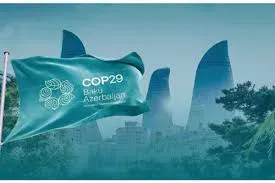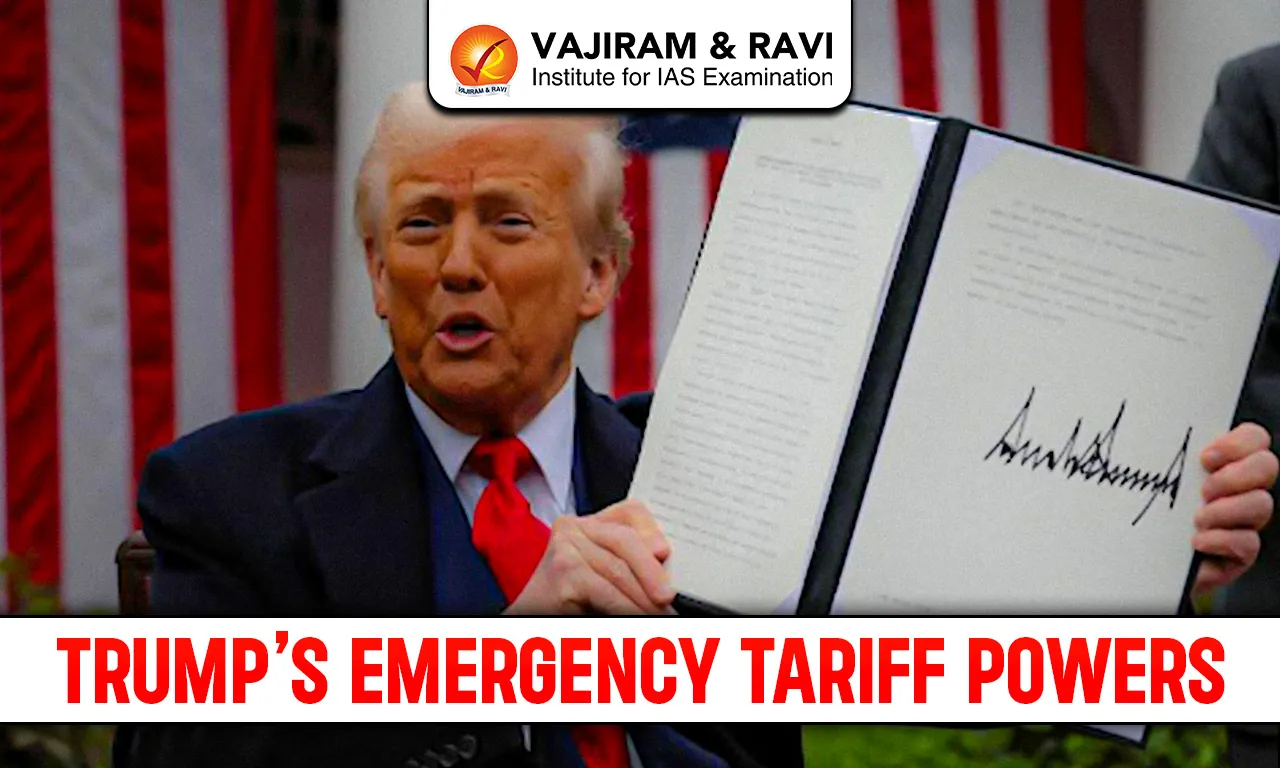What’s in today’s article?
- Why in News?
- Climate-Related Trade Restrictions
- Impact of Climate-Driven Trade Measures
- Conclusion
Why in News?
- The recent climate conference in Baku (COP29) highlighted emerging global friction over climate-related trade measures.
- Led by China and supported by countries like India, a formal request to discuss climate-driven trade restrictions delayed the plenary session.
- Although set aside, the topic is unlikely to fade, with potential implications for global trade dynamics.
Climate-Related Trade Restrictions:
- The EU’s Carbon Border Adjustment Mechanism (CBAM):
- The EU is a large market, accounting for about 15% of global imports. It recently implemented CBAM, taxing specific imports based on their emissions.
- This initiative aims to limit carbon leakage, where industries might otherwise shift production to countries with lax emissions standards.
- CBAM is not the first-of-its-kind trade measure linked to climate change but likely to be the most impactful till now.
- CBAM currently applies to only a handful of goods – emission intensive products such as steel, aluminium or cement – but is set to be expanded on a large number of other items in coming years.
- Concerns regarding CBAM:
- While CBAM aims to curb emissions, studies (including one by the Asian Development Bank) indicate that its impact on emissions reduction may be minimal compared to other climate policies.
- Nonetheless, climate measures are often perceived as tools for achieving broader national objectives, adding a layer of complexity to climate-focused trade policies.
- Other countries might also be tempted to bring in similar regulations. The United Kingdom and Canada are already reported to be considering their own versions.
- Concerns raised by the developing countries:
- While designed to encourage higher global environmental standards, it places developing countries like China and India at a disadvantage, as their products may now face higher costs in EU markets.
- Developing nations argue that CBAM contravenes principles of equity outlined in the Paris Agreement and adds unfair barriers to trade.
- This measure impacts the export competitiveness of these nations while benefiting industries in the developed world that already adhere to strict environmental standards.
- COP 28 (Dubai, UAE) on CBAM: It acknowledged that measures taken to combat climate change, including unilateral ones, should not constitute a means of arbitrary or unjustifiable discrimination or a disguised restriction on international trade.
- Discussion on CBAM at COP29:
- China, speaking on behalf of the BASIC countries (Brazil, South Africa, India, and China), raised concerns about CBAM during the climate conference, facing strong resistance from the EU.
- The proposal for discussion was deferred, but CBAM’s scope and influence are expected to grow as the EU considers applying it to more products.
Impact of Climate-Driven Trade Measures:
- On global supply chains:
- Natural disasters, worsened by climate change, have exposed vulnerabilities in global supply chains, prompting countries to move towards –
- “Nearshoring” (producing closer to home) or
- “Reshoring” (returning production domestically).
- This shift is fueled by concerns over potential trade disruptions and the economic risks posed by climate-related disasters.
- Rising protectionism:
- Climate change has accelerated trade protectionism, as nations increasingly impose measures to safeguard economic and strategic interests.
- However, not all climate-linked trade policies directly address emissions reduction.
- For example, the Inflation Reduction Act in the US incentivises domestic clean technology production, influencing trade but focusing on energy security rather than emissions reductions.
- Case of China:
- China’s control over renewable resources and technology supply chains (e.g., solar, wind, batteries) has led countries like the US to reconsider their reliance on foreign supply chains, especially for strategic energy resources.
- This trend aligns with a broader protectionist approach, though it diverges from traditional economic models favouring cost-effective international production.
Conclusion:
- The convergence of climate policies and trade protectionism is reshaping global trade dynamics, highlighting the tensions between developed and developing nations.
- As countries pursue strategies that align economic and environmental goals, the role of climate in trade policies will likely grow, requiring ongoing dialogue to balance environmental objectives with equitable trade practices.
Q.1. What is India’s take on EU’s Carbon Border Adjustment Mechanism (CBAM)?
India has strongly opposed the CBAM at the WTO and is taking proactive measures domestically to protect its interests and promote sustainable development. These measures include aiming to triple renewable energy capacity by 2030, etc.
Q.2. What are BASIC countries?
The BASIC countries are a bloc of four large newly industrialized countries – Brazil, South Africa, India and China – formed by an agreement in 2009. All are members of BRICS, which also includes Russia and other developing countries that joined the bloc in 2024.
News: Why India and China have pushed against climate change[1]related trade measures at COP29
Last updated on February, 2026
→ UPSC Notification 2026 is now out on the official website at upsconline.nic.in.
→ UPSC IFoS Notification 2026 is now out on the official website at upsconline.nic.in.
→ UPSC Calendar 2026 has been released.
→ UPSC Final Result 2025 is expected to be released in the second week of April 2026.
→ Check out the latest UPSC Syllabus 2026 here.
→ Join Vajiram & Ravi’s Interview Guidance Programme for expert help to crack your final UPSC stage.
→ UPSC Mains Result 2025 is now out.
→ UPSC Prelims 2026 will be conducted on 24th May, 2026 & UPSC Mains 2026 will be conducted on 21st August 2026.
→ The UPSC Selection Process is of 3 stages-Prelims, Mains and Interview.
→ Prepare effectively with Vajiram & Ravi’s UPSC Prelims Test Series 2026 featuring full-length mock tests, detailed solutions, and performance analysis.
→ Enroll in Vajiram & Ravi’s UPSC Mains Test Series 2026 for structured answer writing practice, expert evaluation, and exam-oriented feedback.
→ Join Vajiram & Ravi’s Best UPSC Mentorship Program for personalized guidance, strategy planning, and one-to-one support from experienced mentors.
→ Check UPSC Marksheet 2024 Here.
→ UPSC Toppers List 2024 is released now. Shakti Dubey is UPSC AIR 1 2024 Topper.
→ Also check Best UPSC Coaching in India




















